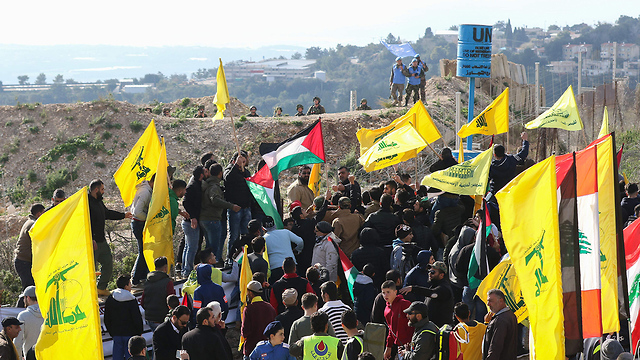The main problem stems not only from a complete conflict of interest between Israel and Iran, but from an identical yet clashing determination of the two sides: The Iranians are determined to build a military power in Syria which will be subject to their authority, and Israel is determined to prevent it. Given that there doesn’t seem to be an outline at the moment that would satisfy both sides, we are likely headed towards further conflicts.
The Israeli government must be commended for deciding to take short-term risks this time to prevent a strategic deterioration in the future. This kind of conduct is untypical, and therefore laudable. Moreover, this is the first time Israel works to militarily prevent its neighbors from building conventional power.

Syrian President Assad (L) and Iranian President Rouhani. A combined effort might force the Iranians to give up their aspirations without dragging us to an all-out war (Photos: AP, EPA)
How can Israel have its way after all? A proper management of four combined efforts might force the Iranians to give up their aspirations, if only partially, without dragging us to an all-out war.
The first effort is to attack important Assad regime assets every time we are faced with an opportunity to attack an Iranian target. Syrian President Bashar Assad isn’t interested in a conflict at this time, and he definitely doesn’t want to lose important assets just because it benefits Iran. This way, we might be able to create tensions between the two and hope Russia takes Assad's side.
The second effort has to do with the Iranian nuclear program. As we know, the United States wants to open the agreement and even add new components—for example, preventing Iran from manufacturing long-range missiles.
Removing the Iranian forces from Syria must be another component. As far as Israel is concerned, by the way, removing the Iranians from Syria is much more important than new missile production restrictions. As part of the “give and take” on a new agreement, the Americans will be able to show some flexibility on certain issues but insist on this new issue.
Other issues are raised in the American-Russia dialogue, and Israel must pressure the US to show more understanding towards other Russian needs (for example, the Western sanctions on Moscow) while gaining a more supportive Russian approach towards the Iranian issue. As always, the Israeli requests have to be prioritized, and what is happening in Syria is the most important thing.

Hezbollah supporters on Israel-Lebanon border. The most significant threat to Israel right now is tens of thousands of Hezbollah rockets (Photo: AFP)
The third effort has to do with Lebanon. The biggest direct threat to Israel at the moment is neither the Syrian threat nor the Iranian threat. The most significant threat to Israel is tens of thousands of Hezbollah rockets. Threatening this organization won’t prevent it from joining the northern conflict. Rather, Israel must make it clear that rockets launched from Lebanon will lead to a full war between Israel and Lebanon. As no one wants to see Lebanon destroyed today—neither Syria and Iran nor Saudi Arabia, France, the US, the Lebanese and even Hezbollah—this message must be stressed and intensified.
The fourth effort is in Gaza. It’s allegedly unrelated, but it is related: As far as Israel is concerned, preventing a conflict with Hamas in the strip and focusing on the northern border is more crucial than ever right now. We must stop the internal Israeli dispute and generously work to improve the economic situation in the strip—even if this is done through the Hamas government.
A proper combination of these four efforts might succeed. We likely won’t be able to avoid additional rounds of violence on the Syrian front, but we will be able to prevent a war and force the Iranians to limit their presence in Syria.
There is already one Israeli achievement: Iran had hoped to build a military militia near the Syrian-Israeli border in the Golan Heights. The previous Israeli strikes made the Iranians give up their plan for a Syrian presence at this stage, which would have been similar to the Hezbollah presence near the Lebanon border.
Major-General (res.) Giora Eiland is a former head of Israel's National Security Council.
To prevent a war, Israel must create an Assad-Iran rift : http://ift.tt/2CaRh9R
No comments:
Post a Comment